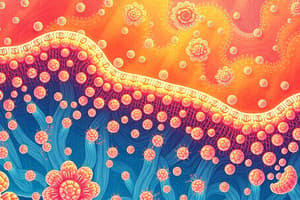Podcast
Questions and Answers
What is the main function of cholesterol in the plasma membrane?
What is the main function of cholesterol in the plasma membrane?
- To serve as receptor proteins
- To transmit information to the cell through signal transduction
- To make up the majority of the plasma membrane's structure
- To help the plasma membrane retain its shape and fluidity (correct)
What is the term used to describe phospholipids, which have both hydrophilic and hydrophobic regions?
What is the term used to describe phospholipids, which have both hydrophilic and hydrophobic regions?
- Hydrophobic
- Amphipathic (correct)
- Lipophilic
- Semipermeable
What is the primary component of the plasma membrane's lipid bilayer?
What is the primary component of the plasma membrane's lipid bilayer?
- Cholesterol
- Phospholipids (correct)
- Proteins
- Carbohydrates
What is the function of receptor proteins in the plasma membrane?
What is the function of receptor proteins in the plasma membrane?
What is the term used to describe the plasma membrane's ability to control the flow of molecules across it?
What is the term used to describe the plasma membrane's ability to control the flow of molecules across it?
What is the model commonly associated with the plasma membrane's structure?
What is the model commonly associated with the plasma membrane's structure?
What is the primary function of channel proteins in a cell?
What is the primary function of channel proteins in a cell?
What type of proteins are specific for ions and molecules and allow for excretion and absorption of molecules?
What type of proteins are specific for ions and molecules and allow for excretion and absorption of molecules?
What is the primary difference between integral monotropic proteins and transmembrane proteins?
What is the primary difference between integral monotropic proteins and transmembrane proteins?
What is the primary function of glycoproteins in a cell?
What is the primary function of glycoproteins in a cell?
What determines the rate at which a molecule diffuses across a protein-free lipid bilayer?
What determines the rate at which a molecule diffuses across a protein-free lipid bilayer?
What is the primary characteristic of peripheral membrane proteins?
What is the primary characteristic of peripheral membrane proteins?
Flashcards are hidden until you start studying
Study Notes
Cell Membrane Structure
- The cell membrane is composed of a lipid bilayer, making it semipermeable and outlining the cell borders.
- Phospholipids are a main component of the plasma membrane, consisting of a phosphate group attached to a glycerol unit with 2 fatty acid tails.
Phospholipid Characteristics
- Phospholipids are amphipathic (dual-loving), with a hydrophilic head and hydrophobic tails.
- The head of the phospholipid is hydrophilic (water-loving), while the fatty acid tails are hydrophobic (water-fearing).
Fluid Mosaic Model
- The fluid mosaic model of the plasma membrane was first proposed by S.J. Singer and Garth L. Nicolson in 1972.
- This model includes phospholipids, cholesterol, proteins, and carbohydrates as the mosaic components of the cell membrane.
Cholesterol Function
- Cholesterol helps maintain the plasma membrane's shape and fluidity.
Protein Functions
- Proteins make up the second major component of plasma membranes.
- Proteins can serve multiple purposes:
- Receptor proteins: perform signal transduction, transmitting information to the cell by sensing the presence or absence of their cognate ligands.
- Channel proteins: allow specific substances to enter the cell, such as tiny substances and water.
- Gated channel proteins: open or close depending on external stimuli, with a binding site.
- Transport proteins (carrier proteins): move substances against the concentration gradient, using ATP, and are specific for ions and molecules.
Glycoproteins and Peripheral Membrane Proteins
- Glycoproteins are proteins attached to carbohydrate chains, serving multiple functions such as cell-to-cell communication and initiating immune responses.
- Integral membrane proteins:
- Transmembrane proteins: span the entire plasma membrane, can be biopic (spans once) or polytopic (spans multiple times).
- Integral monotopic proteins: permanently attached to the membrane from one side.
- Peripheral membrane proteins:
- Most are hydrophilic and found at the surface of the membrane.
- Can attach to a portion of the bilayer or integral membrane protein.
- Can be easily removed as they are only temporarily associated with the membrane.
Carbohydrates
- Found outside the cell, carbohydrates can attach to proteins, forming glycoproteins, or to lipids, forming glycolipids.
Membrane Transport
- Membrane transport is fundamental to the functioning of living organisms, regulating the transport of substances across cell membranes.
- Principles of membrane transport are crucial for scientific knowledge and advancements in medicine, biotechnology, and pharmacology.
Protein-Free Lipid Bilayers
- Protein-free lipid bilayers are highly impermeable to ions.
- Molecules diffuse across the bilayer down their concentration gradient, with rates varying depending on molecule size and solubility in oil.
Studying That Suits You
Use AI to generate personalized quizzes and flashcards to suit your learning preferences.




